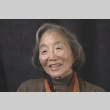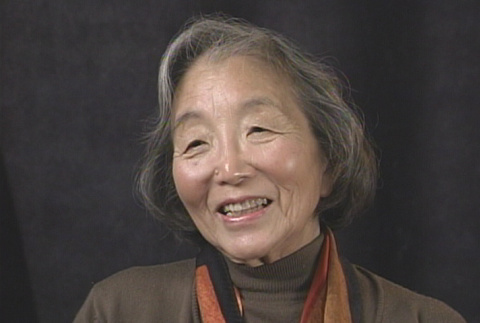64 items
64 items

vh
Kara Kondo Interview Segment 13 (ddr-densho-1000-139-13)
Difficult life for Issei in the early 20th century: "they were pioneers in the Yakima valley"

vh
Kara Kondo Interview Segment 33 (ddr-densho-1000-139-33)
Working as a "society editor" for the "Heart Mountain Sentinel"

vh
Kara Kondo Interview Segment 19 (ddr-densho-1000-139-19)
A frightening incident of racially motivated violence

vh
Kara Kondo Interview Segment 20 (ddr-densho-1000-139-20)
An early period of independence: attending a design school in Seattle

vh
Kara Kondo Interview Segment 55 (ddr-densho-1000-139-55)
Reflections on September 11, 2001, current activities, hopes for the future

vh
Kara Kondo Interview Segment 51 (ddr-densho-1000-139-51)
First hearing of losses suffered by Japanese American families as a result of incarceration

vh
Kara Kondo Interview Segment 54 (ddr-densho-1000-139-54)
Thoughts on redress: hoping for a positive outcome, writing a letter to President Ronald Reagan before the appropriations were made

vh
Kara Kondo Interview Segment 42 (ddr-densho-1000-139-42)
Feeling unwelcome upon returning to the Yakima valley after the war

vh
Kara Kondo Interview Segment 47 (ddr-densho-1000-139-47)
Postwar involvement in political organizations: League of Women Voters, Human Rights Commission

vh
Kara Kondo Interview Segment 46 (ddr-densho-1000-139-46)
Raising children: no direct discussions with them about discrimination, ethnicity

vh
Kara Kondo Interview Segment 50 (ddr-densho-1000-139-50)
Involvement in beginnings of the redress movement: pressuring elected representatives for support

vh
Kara Kondo Interview Segment 35 (ddr-densho-1000-139-35)
Writing society columns for the "Heart Mountain Sentinel"

vh
Kara Kondo Interview Segment 45 (ddr-densho-1000-139-45)
Adopting two children: "it did change my life"

vh
Kara Kondo Interview Segment 41 (ddr-densho-1000-139-41)
Encountering racial segregation in Joplin, Missouri

vh
Kara Kondo Interview Segment 26 (ddr-densho-1000-139-26)
Vivid memories of the day of mass removal: helping the GIs with the move, sadness of father, the sound of the gate closing upon arrival at assembly center

vh
Kara Kondo Interview Segment 21 (ddr-densho-1000-139-21)
Memories of the period following the bombing of Pearl Harbor: unsure if Japanese and Japanese Americans from the Yakima valley would be removed

vh
Kara Kondo Interview Segment 52 (ddr-densho-1000-139-52)
Testifying before the Commission on Wartime Relocation and Internment of Civilians

vh
Kara Kondo Interview Segment 43 (ddr-densho-1000-139-43)
Living and working in Louisville, Kentucky before returning to Yakima, Washington

vh
Kara Kondo Interview Segment 44 (ddr-densho-1000-139-44)
Reestablishing life in Yakima, Washington

vh
Kara Kondo Interview Segment 16 (ddr-densho-1000-139-16)
Social activities during high school years: Young People's Christian Association, sports

vh
Kara Kondo Interview Segment 8 (ddr-densho-1000-139-8)
Elementary school years: no recollection of consciously feeling ethnically "different"

vh
Kara Kondo Interview Segment 9 (ddr-densho-1000-139-9)
Helping out on the family farm during grade school vacations

vh
Kara Kondo Interview Segment 18 (ddr-densho-1000-139-18)
Community activities: girls' club, Japanese dance

vh
Kara Kondo Interview Segment 38 (ddr-densho-1000-139-38)
Moving to Kentucky, and giving a speech on incarceration to a businessman's group there

vh
Kara Kondo Interview Segment 32 (ddr-densho-1000-139-32)
Poignant memories of Christmas in camp: singing carols, receiving gifts from churches on the outside, caroling to a soldier in a guard tower
